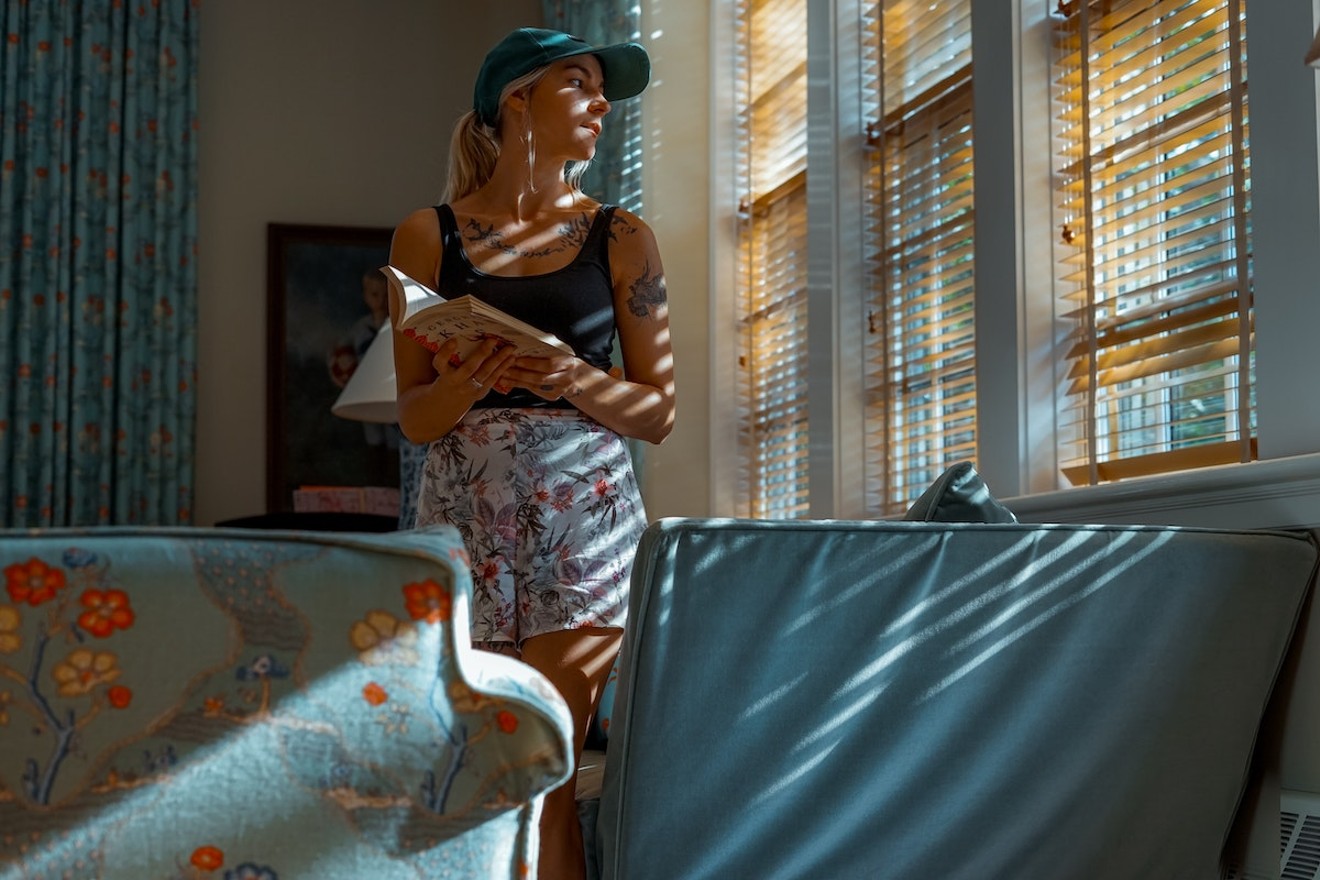While local independent booksellers like Books & Books have closed their physical stores, book lovers can still support local businesses by shopping online. If you're returning to the world of reading after a long hiatus, it may be daunting to start. To assist, we've compiled a list of book recommendations based on popular film genres.
If you relish the creepy rituals of Ari Aster's Midsommar, read Ghost Wall by Sarah Moss.
Ghost Wall is a twisted little exploration of familial and societal dysfunction. Set in a modern-day reenactment camp in northern England, the short novel follows 17-year-old Sylvie as she and her family join an archaeology class experiment to live in the wilderness like the ancient Britons for two weeks. Sylvie's father is definitely a type. Obsessed with all things Old Briton and longing for a time when things were simpler and more savage, he tends to conjure his own versions of history — ones in which women and foreigners are sacrificial or nonexistent.A bus driver by day, the father wields control through physical and emotional abuse, and his only sense of pride comes through his affinity for a bygone era. This experience in the wilderness gives Sylvie's father a chance to exert his authority. Even though the archaeology professor admits that most of what is known of ancient life is speculation, it is clear that hierarchy favors the men in the camp and leaves the women to suffer their whims. By aligning himself with the ancients, Sylvie's father finds a validation that carries no actual weight in the real world.
Sylvie battles with her own feelings of anger and desire — both of which jeopardize her safety. The camp allows Sylvie to experience freedom vicariously through her interactions with the college students in the group. Through them, she fantasizes about a future for herself, and she longs for it. As the days go on, the darkness grows between campers, and the men's fascinations with ancient rituals lead Sylvie closer and closer to a pivotal point of no return.
If Dawn of the Dead and all things zombie are your happy places, read Ling Ma's Severance.
"Is it the end of the world, or just another day at the office?" Twenty-something New Yorker Candace Chen doesn't really know, so she just keeps going to work. Meanwhile, Shen fever is sweeping the world at an alarming rate, turning thousands of people into zombies.Unlike traditional zombies, those in Severance don't relentlessly chase the living around, trying to gnaw them to death. Shen fever is passed through microscopic fungal spores, and the zombies look like everyone else, except they are doomed to repeat meaningless habits or routines without any real brain function. "They could operate the mouse of a dead PC, they could drive stick in a jacked sedan, they could run an empty dishwasher, they could water dead houseplants."
On their best days, the zombies in Chen's dystopia are like most folks at their day jobs — brains off and operating on autopilot. And on their worst days, they're wind-up toys stuck in a corner, marching in place.
While Chen doesn't love her job, she finds some comfort in her own habits. As Shen fever claims more victims, Chen's employers persuade her with an enormous payoff to stay and work while they flee. A recently orphaned, first-generation American of Chinese descent, Chen has a difficult time finding a place or a group in which she fits. While others return to their hometowns and loved ones, Chen exists in a sort of limbo. Ironically, this limbo and relative lack of nostalgia may provide Chen with more immunity to the sickness than her counterparts.
In time, the city's subways stop running. Shops shutter one by one, and New York morphs into something wholly unfamiliar. Chen documents her newly abandoned surroundings by taking photos and posting them on her anonymous blog, NY Ghost. The world may be ending, but people across the globe are still scrolling and liking.
The narrative alternates between Chen's present as a member of a foraging group of survivors (à la AMC's The Walking Dead) on a pilgrimage to find a safe space somewhere on the outskirts of Chicago and her pre-pandemic life as a Bible production coordinator at a publishing company. Chen works a great deal in China, where the first cases of Shen fever emerge, and even as the pandemic spreads, many American companies are more stressed about their product and returns than they are about the human toll of the outbreak.
Chen's ragtag American group of survivors is spearheaded by a woefully lackluster IT specialist named Bob, the stereotypical Everyman that leads every group of survivors in every zombie movie you have ever seen. Here, Candace serves as the anti-Everyman — a lens through which others can see themselves in post-apocalyptic narratives — and the specificity of her immigration story and personal challenges are a stark contrast to Bob's.
Alas, for some, the pandemic challenges of Severance might be too similar to current realities. Like Dawn of the Dead, Severance centers on American consumerism, materialism, and misinformation without being preachy. "Who knew what was true," Candace muses. "The sheer density of information and misinformation at The End, encapsulated in news articles and message-board theories and clickbait traps that had propagated hysterically through retweets and shares, had effectively rendered us more ignorant, more helpless, more innocent in our stupidity." Indeed.

Office Space and Then We Came to the End
Courtesy of Twentieth Century Fox and Little, Brown and Company
If you love the cult-classic Office Space, then read Then We Came to the End by Joshua Ferris.
Then We Came to the End begins with a wave of layoffs, but the joy of the book lies less in the specificity of events and more in the absurdity of its characters. Ferris is a master at character building through delightfully descriptive language. Tom Mota, the first layoff, is attempting to throw his computer through the office window for shock value when we learn that he is "built like a bulldog, stocky with fore-shortened limbs and a rippling succession of necks." This world is swarming with men in ill-fitting khakis, women with outdated hairstyles and music to match, and enough gossip to keep everyone sufficiently distracted from their actual work. People plot on and fight over the chairs of the recently departed and whisper about "reply all" email controversies of years past.The beauty of this office-based story is universality. An unidentified narrator uses the first-person plural "we" perspective to fold the reader into the collective gently. "How we hated our coffee mugs! Our mousepads, our desk clocks, our daily calendars, the contents of our desk drawers. Even the photos of our loved ones taped to our computer monitors for uplift and support turned into cloying reminders of time served." If you're currently sitting out the pandemic at home and waxing nostalgic over office life in a way that might be masochistic, you'll surely enjoy this off-kilter work comedy.

Toy Story and Don't Let the Pigeon Drive the Bus
Courtesy of Walt Disney Pictures and Hyperion Books/Mo Willems














